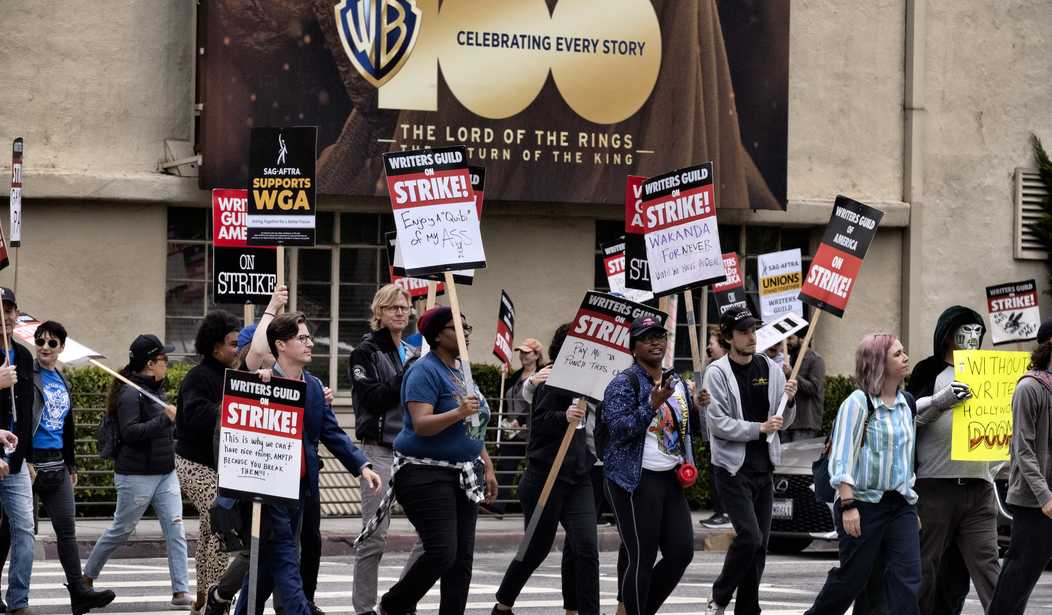The Hollywood writer's strike that has marched on since May 2 was recently joined by the Screen Actors Guild, marking the first time they went on strike together since 1960.
The occurrence 60 years ago was over residuals in television, and now the Writers Guild of America and SAG-AFTRA are fighting for better residuals from streaming services. The 11,000 writers will happily take the 160,000 actors in a battle expected to drag on until late October. However, just like the case of the '60s strike, led by then-president of SAG Ronald Reagan, a compromise may be the only way to end this sooner rather than later.
Finding the middle ground may be harder this time around because the writer's complaints don't end at residuals. They're also arguing for higher median weekly pay, adjusted for inflation, which has fallen 23 percent over the last decade, the WGA said.
In addition, screenwriters are also employed for shorter periods of time, as streaming service style may release all episodes together rather than following the weekly schedule of network television. Although the new projects, which average 20 weeks of work for streaming and 30 weeks for network television, are more compressed, the actual amount of writing/editing isn't always reflected by the quicker release schedules. The actors and writers are getting paid a small percentage of a larger budget to do more in a condensed amount of time, meaning they'll have to find and be hired for more projects yearly to make a living.
Available projects have also diminished because of Artificial Intelligence and Mini rooms. AI is a critical point for the guilds, as they aim to protect writers' jobs from being taken by robotic scripts developed by AI and to safeguard actors' faces/likenesses from being used for AI projections. The second problem is that mini rooms allow studios to hire freelance writers to work on parts of a script or show at a time and be given less pay for their roles, promoting the habits of a 'gig' economy. They also separate the writers from the rest of the production, making it harder for them to learn and become more involved with projects.
Recommended
The magnitude of these new contract demands has probed a harsh reaction, further alluding to a potentially lingering mutiny. One studio executive told Deadline: “The endgame is to allow things to drag on until union members start losing their apartments and losing their houses."
Although the Alliance of Motion Picture and Television Producers (AMPTP) said this anonymous source doesn't speak for them, it is a coldly calculated strategy that could work in their favor. When an actor or writer seeks a career in Hollywood, they are encouraged to join these guilds and unions that now demand all members abide by the strike rules. This means they can't act, write, promote, or perform in any way for Hollywood production companies. For a screen artist already living on edge from their unfair pay, the choice may be to work or be left on the street. If an actor is getting their break in a recently released movie, the most beneficial thing for their career would be to promote the product.
So what does this mean for Hollywood viewers? The shutdown won't stop the release of films and tv shows already finished. Soap operas like Days of Our Lives and other pre-filmed network television shows will have a backlog of episodes to release while the strike continues. The highly anticipated projects that don't fit this bill will be put on the back burner, including Stranger Things, The Handmaid's Tale, and The Last of Us. Comedy sketch shows like Saturday Night Live, and late-night talk shows will also be forced to pause. Reality and game shows will be able to continue since they don't involve writers and actors from these guilds.
Yes, it may be a while before viewers can count on original content, but even with many postponed projects, the questions remains: who cares?
Who else doesn’t give a flying rats patoot that Hollywood writers are on strike?
— 🌺 Bekah 🌸 (@TGrammie2) July 14, 2023
Many Americans have long been disgruntled with Hollywood, but whether or not it's the writer's left-wing agenda or the studio's forcing them to create predictable content is a question many commenters haven't considered.
With all the commotion in Hollywood, an independent filmmaker is even more encouraged to continue their solo journey. For now, most actors and writers can only participate in independent films, although they might not have much more to pay than the big conglomerates. Writers, actors, and directors may follow in the footsteps of social media influencers who collect the majority of the money from their project generates.
From the streaming services' perspective, they were losing money before the strikes. On the whole, major streaming services like Disney (Disney+), NBCUniversal (Peacock), Paramount (Paramount+), and Warner Bros Discovery (HBO Max and Discovery+) have reported total combined losses of over $18 billion since 2020, according to The Media Leader. This may end in many big streaming services crumbling and film artists either creating new, fairer conglomerates or looking to get funded by private donors. If that's the case, it is still unlikely that the average writer or actor will make a steady living in a business built to serve only the most talented.

























Join the conversation as a VIP Member